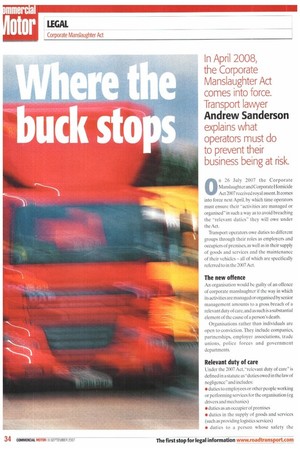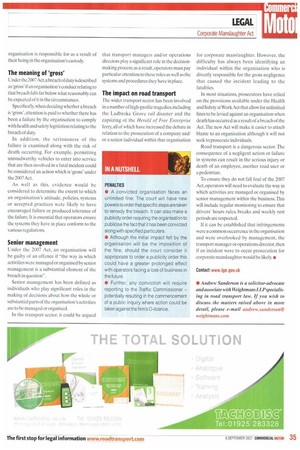In April 2008, the Corporate Manslaughter Act comes into force.
Page 34

Page 35

If you've noticed an error in this article please click here to report it so we can fix it.
Transport lawyer Andrew Sanderson explains what operators must do to prevent their business being at risk.
0 n 26 July 2007 the Corporate Manslaughter and Corporate Homicide Act 2(X)7 received royal assent. It conies into force next April, by which time operators must ensure their "activities are managed or organised" in such a way as to avoid breaching the "relevant duties" they will owe under the Act.
Transport operators owe duties to different groups through their roles as employers and occupiers of premises, as well as in their supply of goods and services and the maintenance of their vehicles — all of which are specifically referred to in the 2007 Act.
The new offence An organisation would he guilty of an offence of corporate manslaughter if the way in which its activities are managed or organised by senior management amounts to a gross breach of a relevant duty of care, and as such is a substantial element of the cause of a person's death.
Organisations rather than individuals are open to conviction. They include companies, partnerships. employer associations, trade unions, police forces and government departments.
Relevant duty of care Under the 2007 Act. "relevant duty of care" is defined in a statute as "duties owed in the law of negligence" and includes: • duties to employees or other people working or performing services for the organisation (eg drivers and mechanics) • duties as an occupier of premises • duties in the supply of goods and services (such as providing logistics services) • duties to a person whose safety the organisation is responsible for as a result of their being in the organisation's custody.
The meaning of 'gross' Under the 2007 Act, a breach of duty is described as 'gross' if an organisation's conduct relating to that breach falls far below what reasonably can be expected of it in the circumstances.
Specifically. when deciding whether a breach is 'gross', attention is paid to whether there has been a failure by the organisation to comply with health and safety legislation relating to the breach of duty.
In addition, the seriousness of the failure is examined along with the risk of death occurring. For example. permitting unroadworthy vehicles to enter into service that are then involved in a fatal incident could he considered an action which is 'gross' under the 2007 Act.
As well as this, evidence would be considered to determine the extent to which an organisation's attitude, policies, systems or accepted practices were likely to have encouraged failure or produced tolerance of the failure. It is essential that operators ensure the systems they have in place conform to the various regulations.
Senior management Under the 2007 Act, an organisation will be guilty of an offence if "the way in which activities were managed or organised by senior management is a substantial element of the breach in question".
Senior management has been defined as individuals who play significant roles in the making of decisions about how the whole or substantial parts of the organisation's activities are to be managed or organised.
In the transport sector, it could be argued that transport managers and/or operations directors play a significant role in the decisionmaking process; as a result, operators must pay particular attention to these roles as well as the systems and procedures they have in place.
The impact on road transport The wider transport sector has been involved in a number of high-profile tragedies,including the Ladbroke Grove rail disaster and the capsizing of the Herald of Free Enterprise ferry, all of which have increased the debate in relation to the prosecution of a company and/ or a senior individual within that organisation for corporate manslaughter. However, the difficulty has always been identifying an individual within the organisation who is directly responsible for the gross negligence that caused the incident leading to the fatalities.
In most situations, prosecutors have relied on the provisions available under the Health and Safety at Work Act that allow for unlimited fines to be levied against an organisation when death has occurred as a result of a breach of the Act. The new Act will make it easier to attach blame to an organisation although it will not seek to prosecute individuals.
Road transport is a dangerous sector. The consequence of a negligent action or failure in systems can result in the serious injury or death of an employee, another road user or a pedestrian.
To ensure they do not fall foul of the 2007 Act, operators will need to evaluate the way in which activities are managed or organised by senior management within the business. This will include regular monitoring to ensure that drivers' hours rules, breaks and weekly rest periods are respected.
If it can be established that infringements were a common occurrence in the organisation and were overlooked by management, the transport manager or operations director, then if an incident were to occur prosecution for corporate manslaughter would be likely. • Contact: www.lge.gov.uk
• Andrew Sanderson is a solicitor-advocate and associ are with Weightmans LLPspecialising in road transport law. If you wish to discuss the matters raised above in more detail, please e-mail andrew.sanderson@ weightman.s.cont
































































































































































































